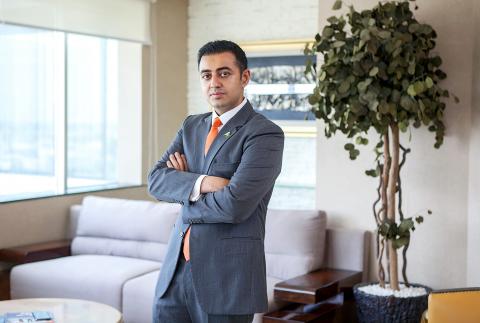Agha Steel Industries Ltd is planning Pakistan’s biggest-ever private sector initial public offering (IPO) this year to help boost output as China funds more than US$55 billion in infrastructure projects across the nation and a buoyant stock market spurs investor demand.
The Karachi-based company plans to raise as much as 10 billion Pakistani rupees (US$95.41 million) selling a 25 percent stake, executive director Hussain Agha said in an interview.
The sale would be the largest since the government stake sale of Habib Bank Ltd in 2007 worth 12 billion Pakistani rupees.

Photo: Bloomberg
Steel and cement makers in Pakistan are expanding to meet demand as China’s “One Belt, One Road” initiative spurs construction.
The nation’s economy has grown at about 5 percent per year since 2013, encouraging Agha’s peers including International Steels Ltd and Aisha Steel Mills Ltd to lift production.
“You need roads, skyrises and housing,” Agha said. “Pakistan’s steel industry is in an infancy stage and growing at a massive pace — the whole environment will change.”
The company is to use the funds for a US$50 million expansion that could triple output to 500,000 tonnes within two years.
Production would then double to 1 million tonnes by 2023, he said.
Habib Bank has been appointed financial adviser, while Arif Habib Ltd and BMA Capital Ltd were picked as bookrunners for the transaction.
Pakistan’s steel output last year grew 23 percent to 3.6 million tonnes, the biggest gain among 40 nations, the World Steel Association said.
Agha Steel expects construction-grade steel, such as rebars and wire rods, to grow as much as 12 percent annually for the next three years.
The nation’s construction sector expanded 13 percent in the year ended June last year, more than twice the pace of the previous 12 months, the State Bank of Pakistan’s annual report said.
Rapid urbanization and rising income levels have left the nation with an annual shortfall of 500,000 homes, real-estate developer Arif Habib said.
“Real estate is the main engine for this growth, it has really picked up,” said Ayub Khuhro, chief investment officer of Karachi-based Faysal Asset Management Ltd, which has about 8 billion Pakistani rupees in stocks and bonds. “The government is also willing to protect companies with anti-dumping measures.”
In February, Pakistan imposed anti-dumping duties on Chinese imports of galvanized coils and sheets for five years to aid producers in a nation where steel usage per capita is almost half of its neighbor India, Agha said.
Favorable industry policies aside, some family-owned companies are also tapping investor demand that made the nation’s stock market Asia’s best performer last year.
Even so, less than six companies per year go public in Pakistan, a country where many businesses are conservative in risk taking and often unwilling to open their books to public scrutiny.
Amreli Steels Ltd has seen its shares more than double after raising 3.8 billion Pakistani rupees two years ago.
The company, whose products are similar to those manufactured by Agha Steel, has announced another expansion this month.

To many, Tatu City on the outskirts of Nairobi looks like a success. The first city entirely built by a private company to be operational in east Africa, with about 25,000 people living and working there, it accounts for about two-thirds of all foreign investment in Kenya. Its low-tax status has attracted more than 100 businesses including Heineken, coffee brand Dormans, and the biggest call-center and cold-chain transport firms in the region. However, to some local politicians, Tatu City has looked more like a target for extortion. A parade of governors have demanded land worth millions of dollars in exchange

An Indonesian animated movie is smashing regional box office records and could be set for wider success as it prepares to open beyond the Southeast Asian archipelago’s silver screens. Jumbo — a film based on the adventures of main character, Don, a large orphaned Indonesian boy facing bullying at school — last month became the highest-grossing Southeast Asian animated film, raking in more than US$8 million. Released at the end of March to coincide with the Eid holidays after the Islamic fasting month of Ramadan, the movie has hit 8 million ticket sales, the third-highest in Indonesian cinema history, Film

Taiwan Semiconductor Manufacturing Co’s (TSMC, 台積電) revenue jumped 48 percent last month, underscoring how electronics firms scrambled to acquire essential components before global tariffs took effect. The main chipmaker for Apple Inc and Nvidia Corp reported monthly sales of NT$349.6 billion (US$11.6 billion). That compares with the average analysts’ estimate for a 38 percent rise in second-quarter revenue. US President Donald Trump’s trade war is prompting economists to retool GDP forecasts worldwide, casting doubt over the outlook for everything from iPhone demand to computing and datacenter construction. However, TSMC — a barometer for global tech spending given its central role in the

Alchip Technologies Ltd (世芯), an application-specific integrated circuit (ASIC) designer specializing in server chips, expects revenue to decline this year due to sagging demand for 5-nanometer artificial intelligence (AI) chips from a North America-based major customer, a company executive said yesterday. That would be the first contraction in revenue for Alchip as it has been enjoying strong revenue growth over the past few years, benefiting from cloud-service providers’ moves to reduce dependence on Nvidia Corp’s expensive AI chips by building their own AI accelerator by outsourcing chip design. The 5-nanometer chip was supposed to be a new growth engine as the lifecycle